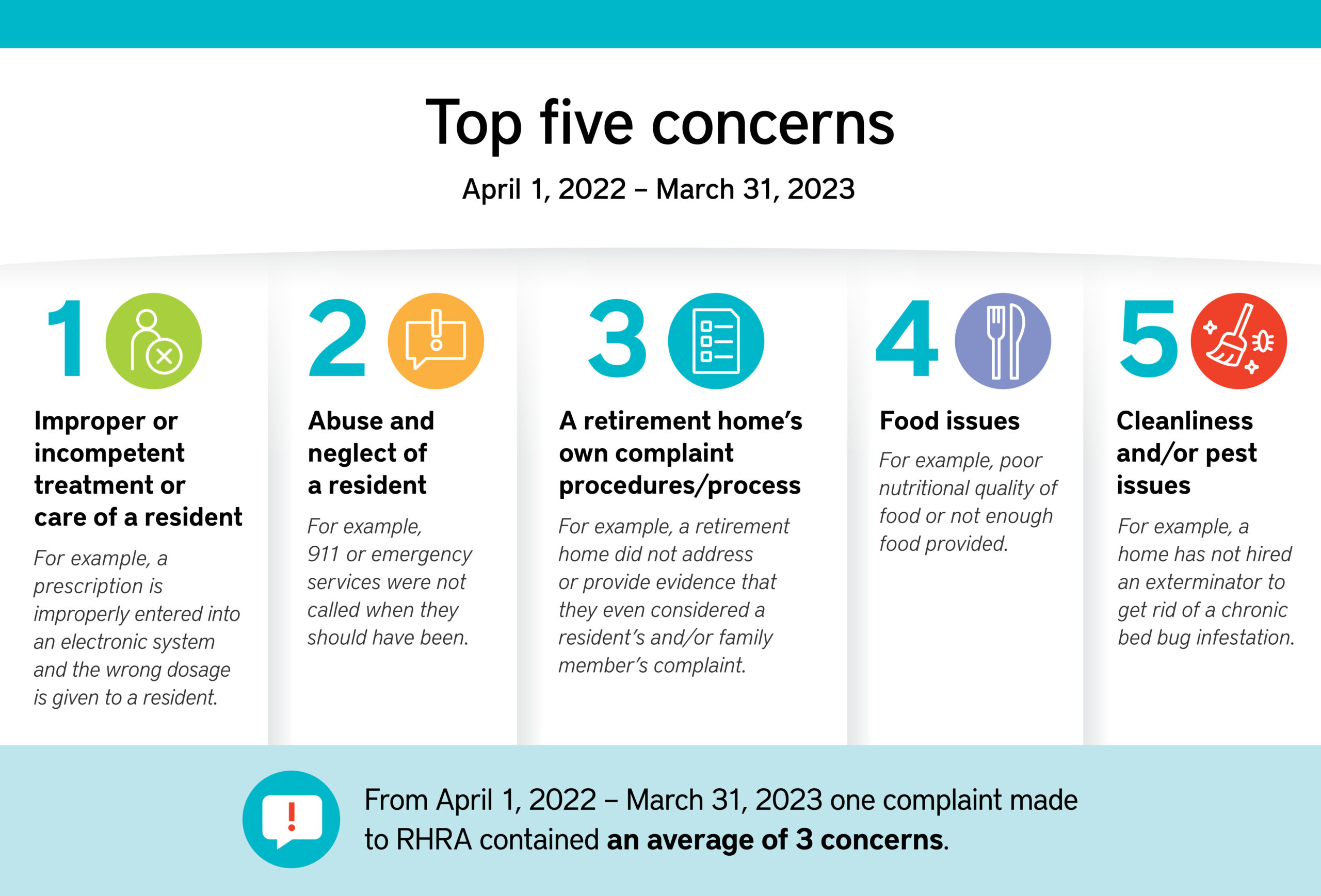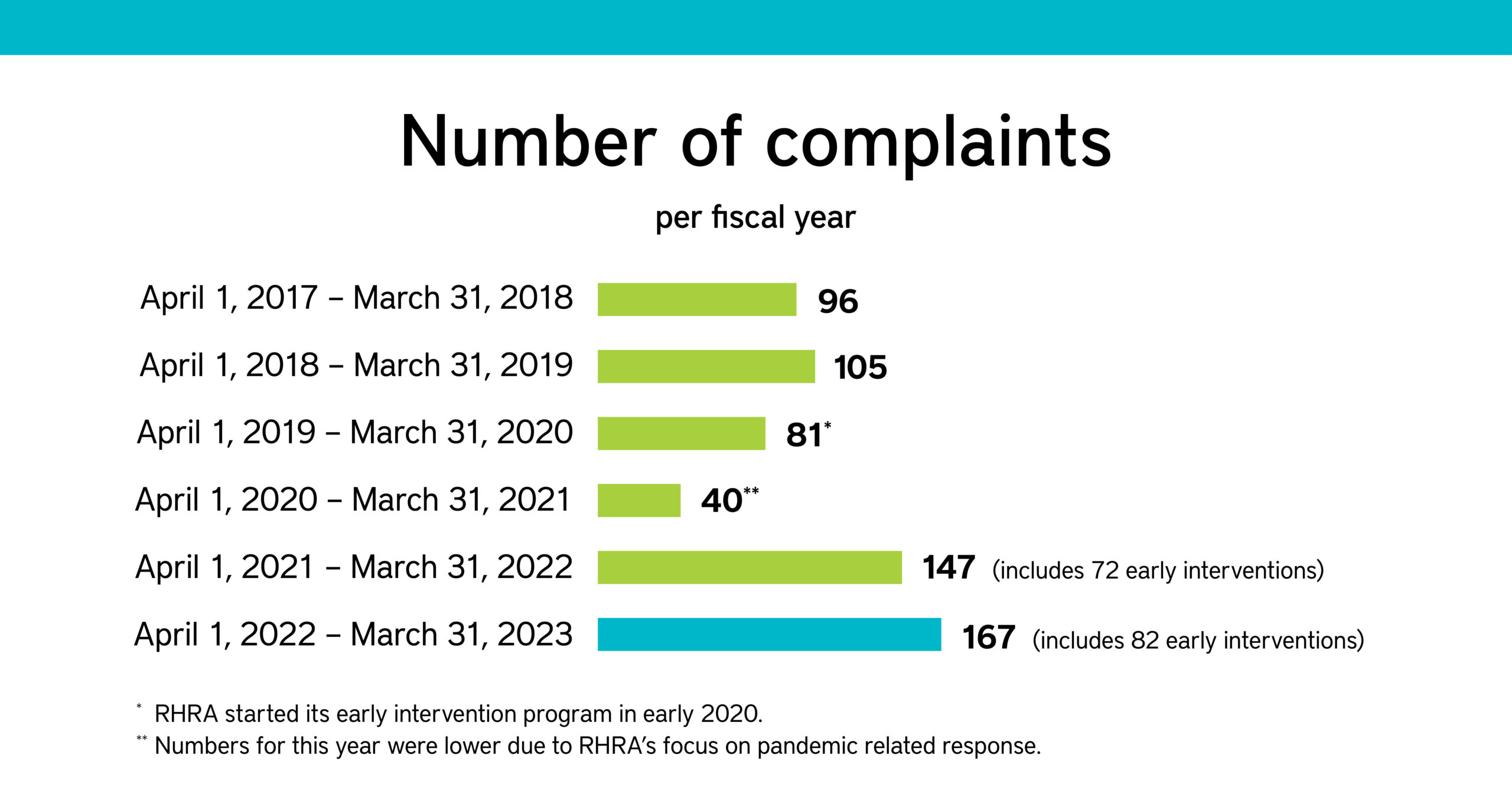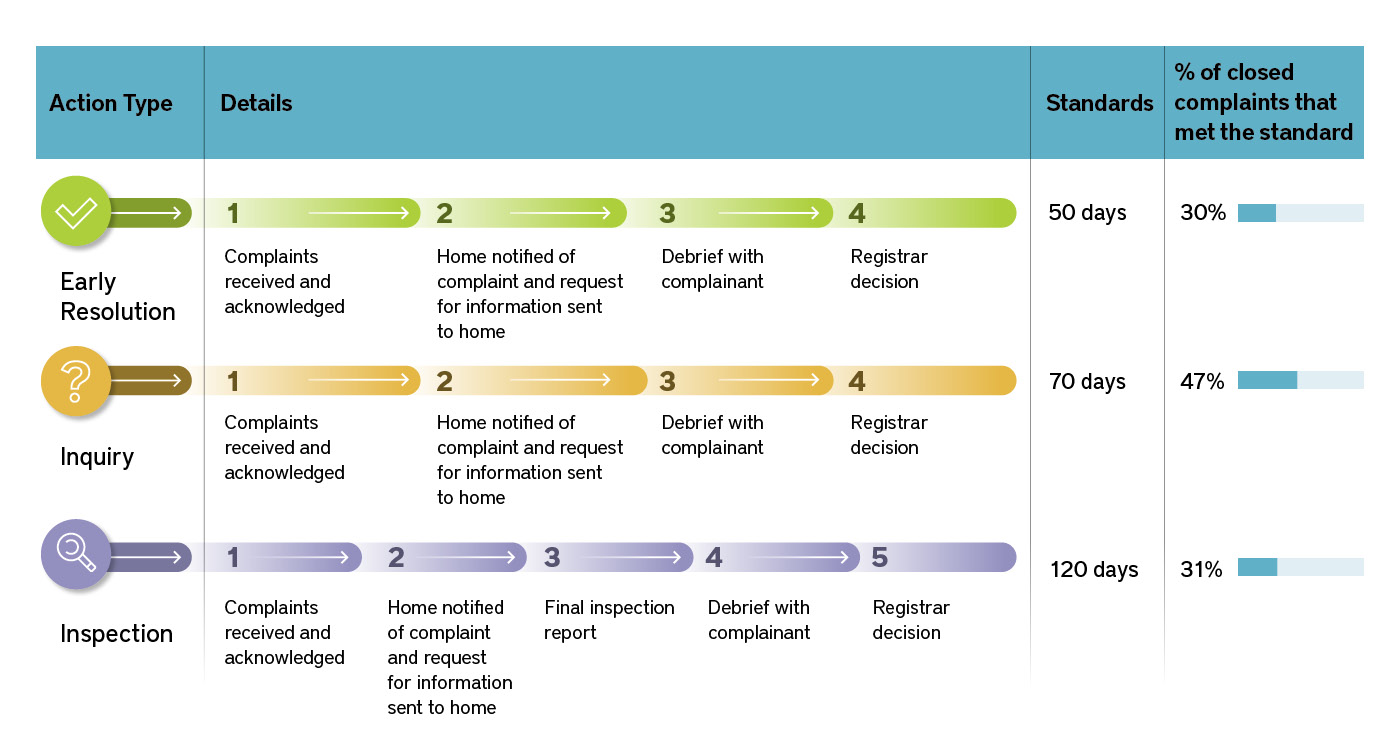By law, all retirement homes in Ontario are required to have a procedure for responding to complaints about the operation of the home. In addition, all staff members working in the home are required to be trained on the home’s complaints procedure. You can find the home’s complaints procedure in the information package provided to you or you can ask the home for a copy.
In spite of everyone’s best efforts, there may be a concern about the quality of care, operation of the home or actions of a staff member that impacts a resident’s well-being. If you have a concern, bringing it up directly with the home’s staff or management team is your best first step.
Once the home is aware of the complaint, they are required to investigate. They must acknowledge your complaint within 10 business days to let you know how they plan to resolve the issue, when the issue will be resolved or if they believe the complaint is unfounded. If the home believes the complaint is unfounded, they must explain why.
If your complaint is still not resolved, the next step may be to file a complaint with the RHRA
When a complaint is filed with the RHRA, you and others providing information are protected. The RHRA may take action against those who discourage complaints, threaten or retaliate against a person who files a complaint. This may include fines or even prosecution.
What is a complaint?
RHRA looks into every complaint it receives and makes sure complainants are informed throughout the complaint-handling process. Our goal is to help resolve complaints as fairly, thoroughly, and quickly as possible.
Complaint: A complaint relates to a home that has not followed the Retirement Homes Act or regulation. A complaint can include a report of harm or risk of harm to a resident and can be made through any means (email, phone, etc.). It can be made anonymously.
Formal Complaint: A complaint submitted to RHRA in writing that a home has not followed the Retirement Homes Act or regulation. A formal complaint is submitted in writing and includes all required consents about privacy and access to personal and health information. The Registrar reviews all formal complaints and issues a decision about the concerns. A formal complaint to RHRA cannot be made anonymously.
Concern: The specific topic(s) of the complaint.
Early Intervention: A process where RHRA helps families and homes resolve concerns together rather than proceeding through a formal complaints process. For example, a complaint about the nutritional quality of food may be resolved in discussion with the complainant and the home.


For issues the RHRA does not oversee:
We refer people to the proper organization to ensure they get the help they need. The organizations listed here might be able to help if RHRA doesn’t have the authority to look into your issue. For example:
- Employer/employee relationships – the RHRA does not have the authority to mediate workplace disputes or to terminate employees in a home. For more information about employee rights contact the Ministry of Labour or the Human Rights Tribunal of Ontario.
- Rent rebates, notification periods, and evictions. The RHRA does not have the authority to provide financial compensation to residents, families or complainants in these matters. For more information contact the Landlord Tenant Board.
- Power of Attorney disputes. Contact the Ontario Public Guardian and Trustee
For a list of other common issues the RHRA does not oversee and who to contact, click here.
How to file a complaint with the RHRA
Note: When using the form, the latest version of Adobe Reader is required (https://get.adobe.com/reader/)
All complaints must be submitted in writing:
- by completing the RHRA Complaint Form or
- by letter or email. Complaints by letter or email require your consent as your name will be disclosed when RHRA notifies the home of the complaint.
Sometimes complaints contain information about a resident that is personal, such as health information. To protect the rights and privacy of retirement home residents, you may need to fill out one or more forms.
If you are not a resident, RHRA can’t share any personal information about the resident unless the following documents are provided:
Power of Attorney (Resident is not capable)
Executor of Estate (Resident is deceased)
- If the resident is capable* – Please provide an Authorization Form signed by the resident.
- If the resident is not capable* – Please provide the appropriate Power of Attorney (POA) or Guardianship document. Please note: depending on the nature of the complaint (e.g. if it involves personal health information, such as care services being received, or financial-related information) , RHRA may need the POA for Personal Care or POA for Property document to share the resident’s personal information. If you are not the resident’s Attorney or Guardian, please also provide an Authorization Form signed by the Attorney/Guardian.
- If the resident is deceased – Please provide documentation of the resident’s Estate Trustee. This can be either the resident’s Will or the Certificate of Appointment of Estate Trustee. If you are not the resident’s Estate Trustee, please also provide an Authorization Form signed by the Estate Trustee.
* Capable means that the resident is legally able to make their own decisions.
The Complaint and Authorization Form can be submitted by:
- fax: 1-855-631-0170
- mail: 55 York Street, Suite 700, Toronto, ON M5J 1R7
- email: info@rhra.ca
If you need help submitting a complaint or have any questions about the process, call us at 1‐855‐275‐7472.
What can you expect after submitting a complaint?
The RHRA will process your complaint as quickly as possible. Once your written complaint is received, we will review it and a staff member will contact you to discuss it in more detail.
The RHRA will then notify the home of the complaint. The notification involves disclosing some or all of the information you provided, including the name of the complainant and the details of the complaint, with the retirement home.
Depending on the nature of the complaint, we may:
- request information from the home to respond to your concerns;
- conduct an inspection of the home;
- attempt to mediate the concerns;
- send an education letter to the home; or
- take other action, including enforcement.
The RHRA makes every effort to address complaints in a timely manner. The Registrar considers all information submitted to arrive at a decision. Some complaints may take more time to review and conclude. Once a decision has been made, you will receive a written letter explaining what actions were taken and the outcome of those actions.
As part of RHRA’s commitment to transparency, the chart below represents the service level standards RHRA strives to meet when dealing with complaints. For more complex complaints, RHRA may require additional time to ensure a thorough review is conducted in order to determine appropriate action.

If your complaint leads to an inspection
Once an inspector has completed the inspection, a copy of the draft inspection report is provided to the retirement home, and the operator has 10 business days to respond to the findings.
The final inspection report, which does not contain confidential information, is posted on the RHRA’s Retirement Home Database and in the retirement home.
The RHRA may carry out a follow-up inspection, to see if the home has come into compliance.
If you don’t agree with the RHRA’s decision
If the Registrar considers a complaint and decides no further action is to be taken, you have the right to request a review by the Complaints Review Officer (CRO). The CRO is independent of the RHRA and will review all the information considered in the Registrar’s decision. Requests for review must be made in writing to the RHRA within 60 days of receipt of the Registrar’s decision letter. After reviewing the complaint, the CRO may decide to uphold the Registrar’s decision or refer the complaint back to the Registrar with a recommendation that the Registrar take further action. The complainant is always made aware of the decision.
Information about the approximate timing for complaint reviews is available here. If a complainant requests a review by the CRO and later withdraws the request, the CRO is not required to look into the matter further. However, where the complainant does not respond to communications with the CRO, the CRO will proceed with the review and make a decision based on the available information.
Do you suspect harm or a resident at risk?
Additional helpful resources
Take a look at this Infographic on how RHRA deals with complaints along with possible outcomes.
Reporting harm to the RHRA must be done when anyone sees or suspects a situation that harms or puts a resident at risk of harm. These are known as mandatory reports. If you see or suspect a retirement home resident is being harmed or is at risk, please call 1‐855‐275‐7472 with as much detail as possible on the situation. Those reporting harm can remain anonymous. If you choose to leave your contact information RHRA staff will follow up with you in the event more information is required.
Learn about your rights as a resident of a licensed retirement home in Ontario under the Retirement Homes Act, 2010.
Read the Retirement Homes Act, 2010. RHRA is mandated by the government to ensure Ontario’s retirement homes comply with the Act.
The Retirement Homes Act, 2010 is available at www.e-laws.gov.on.ca.
The Retirement Homes Regulatory Authority partners with Consumer Protection Ontario.

